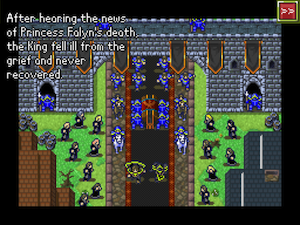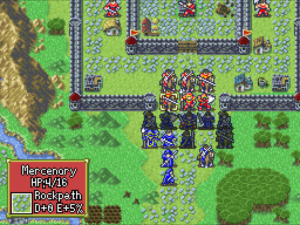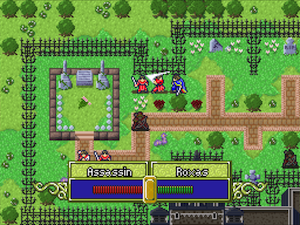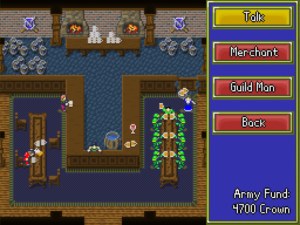When I first started playing Partia (out now, $3.99) – a game recently released on the iOS platform by Imago Software – I was immediately given the mistaken impression that I was actually playing a port of a console Strategy-RPG, possibly previously released on either the Playstation or SNES. The seemingly obvious signs were all over the game: retro graphics where even the text fonts themself were pixelated, menus laid out in a way that seemed to suggest a controller was originally used in the past, black bars on the side of the screen constraining the image to a classical 4×3 presentation, etc. However, the truth of the matter is that Imago Software’s Partia is actually an all new title that plays itself exactingly close to the mechanics of the previous strategy jRPGs – chiefly: Fire Emblem – of which it attempts to pay homage to.
 The game’s tale begins in the kingdom of Grana where the younger of the current king’s two sons – name given only after you provide him with one – attempts to save the life of his sister from a rebel upstart, which doesn’t quite go as planned. Upon receiving the grim news of his only daughter’s untimely demise – coupled with the stress created by the current political unrest – the King immediately falls ill, passing away a few days later, leaving the crown to his elder son. Still being haunted by the death of his sister – which he failed to prevent – the young prince then proceeds to begin wandering the countryside, until he suddenly gets caught up in the midst of a grander conspiracy.
The game’s tale begins in the kingdom of Grana where the younger of the current king’s two sons – name given only after you provide him with one – attempts to save the life of his sister from a rebel upstart, which doesn’t quite go as planned. Upon receiving the grim news of his only daughter’s untimely demise – coupled with the stress created by the current political unrest – the King immediately falls ill, passing away a few days later, leaving the crown to his elder son. Still being haunted by the death of his sister – which he failed to prevent – the young prince then proceeds to begin wandering the countryside, until he suddenly gets caught up in the midst of a grander conspiracy.
I am happy to report that the prose is well written and completely free of the grammatical issues that often plague many other original iOS RPGs, probably because English was the language that Partia was first created with. I would also like to commend the game for being able to dole out information about the world and unit types without resorting to a giant separate encyclopedia, such as was seen in Kirin Wars (another semi-recent iOS original strategy RPG). That said, the game does seem to have a penchant for using lesser known words – such as ‘Retinue’ and ‘Dilettante’ – which might send some gamers scrambling for a dictionary in order to keep up (although I’m not entirely sure they used ‘Dilettante’ correctly).
 The gameplay itself is deliberately patterned around the mechanics of Nintendo’s Fire Emblem practically to a ‘T’, to the point where Partia is more or less essentially an iOS port of a hypothetical Fire Emblem game that never existed. Unfortunately, it didn’t copy the penchant that Fire Emblem – as well as many other Japanese made Strategy RPGs – had for dramatically zooming in when two units attack each other. However – minus that one disappointing omission – everything else a fan of the Fire Emblem series could possibly want from an iOS game can all be found here in Imago Software’s Partia.
The gameplay itself is deliberately patterned around the mechanics of Nintendo’s Fire Emblem practically to a ‘T’, to the point where Partia is more or less essentially an iOS port of a hypothetical Fire Emblem game that never existed. Unfortunately, it didn’t copy the penchant that Fire Emblem – as well as many other Japanese made Strategy RPGs – had for dramatically zooming in when two units attack each other. However – minus that one disappointing omission – everything else a fan of the Fire Emblem series could possibly want from an iOS game can all be found here in Imago Software’s Partia.
For those who aren’t familiar with Fire Emblem, Partia could best be described as a more colorful game of chess filled with RPG stats and dramatic speeches about morality and betrayal. During each round of combat you will have the chance to move all of the units in your forces (I particularly like the fact that Partia permits you to undo a move if your change your mind), use items that may be in your men’s inventory, as well as target any opposition that ends up in your range. Once all of your own units have taken their respective turns – or not if you’d rather simply keep some of your men in place for strategic reasons – the enemy will do the same for all of their units, after which lather-rinse-repeat.
 A particularly nice touch in the game is that when you have one unit targeting another it will tell you the fixed potential damage each would do if they hit (based on weapons, strength, and armor involved), how likely each is to hit the other (based on their personal accuracy and the target’s speed), what the odds of each getting a double damage critical hit are, as well as how much life each still has left. So – even if you temporarily forget that your mage is wearing no armor – the game will politely remind you how hard a unit stands to be trounced if you initiate a fight, giving you a chance to reconsider sans loss of life. This is especially valuable since each unit in your army represents a single named individual, whom once dead is irreplaceably gone and will never be coming back (even if a soldier with similar skills is later on hired).
A particularly nice touch in the game is that when you have one unit targeting another it will tell you the fixed potential damage each would do if they hit (based on weapons, strength, and armor involved), how likely each is to hit the other (based on their personal accuracy and the target’s speed), what the odds of each getting a double damage critical hit are, as well as how much life each still has left. So – even if you temporarily forget that your mage is wearing no armor – the game will politely remind you how hard a unit stands to be trounced if you initiate a fight, giving you a chance to reconsider sans loss of life. This is especially valuable since each unit in your army represents a single named individual, whom once dead is irreplaceably gone and will never be coming back (even if a soldier with similar skills is later on hired).
As the battles are slow and deliberately paced affairs, especially as the player progresses deeper into Partia’s story, it is particularly fortuitous that the developer included a suspend battle option for those who weren’t planning to play iOS games in hour-plus long chunks. These ‘battle suspensions’ are not permanent saves – however – and will only return the player to where they last left off, ceasing to exist immediately after they have been loaded up. For more permanent saves the game has three save slots, convenient if you’re using an iOS device that will regularly be shared with someone else, that can only be accessed between Partia’s chapters/stages.
 At the end of a stage you will be awarded an amount of currency – known as Crowns – based on your performance in the previous stage, calculated from how many enemy units you slay minus your own personal losses (encouraging players to track down every last enemy soldier before taking out the leader). With this money you can upgrade/replace the gear your men are carrying (weapons and armor wear out over time), hire travelling mercenaries that you happen across, and acquire items such as health potions and keys (needed to force open doors on the battle map, as well as open treasure chests). While Partia thankfully features no IAPs whatsoever, it does have a feature wherein players are offered bonus Crowns if they permit the game to post regular updates about their progress through the young prince’s adventure to their Facebook page.
At the end of a stage you will be awarded an amount of currency – known as Crowns – based on your performance in the previous stage, calculated from how many enemy units you slay minus your own personal losses (encouraging players to track down every last enemy soldier before taking out the leader). With this money you can upgrade/replace the gear your men are carrying (weapons and armor wear out over time), hire travelling mercenaries that you happen across, and acquire items such as health potions and keys (needed to force open doors on the battle map, as well as open treasure chests). While Partia thankfully features no IAPs whatsoever, it does have a feature wherein players are offered bonus Crowns if they permit the game to post regular updates about their progress through the young prince’s adventure to their Facebook page.
One big word of caution to those who in general prefer that a game has resolution after they spends tens of hours with it, currently Partia stops on a cliffhanger that is meant to be resolved in a potential future sequel. However, as Imago Software themself have currently admitted on their own store page, the odds of a Partia 2 are currently not looking so well unless sales of the first game begin to seriously improve. That isn’t to say there’s no value to be had in the game right now, quite far from it, but it is important to remember when purchasing Partia that one might never receive any plot resolution.
iFanzine Verdict: In the end Partia is almost like having a port of a lost Fire Emblem title on your iOS device, except that it lacks the battle close-ups traditionally common to most classical strategy jRPGs. The dialogue – written first in English – is naturally handled far better than most other original iOS RPGs that tend to come from either China or Korea, pity that the plot itself ends on a cliffhanger and might end up not being resolved. For those who want the slow methodical style battles from strategy jRPG series such as Fire Emblem or Shining Force, this game – thanks in large part to its ‘battle suspend’ option – should be just what they are looking for.


